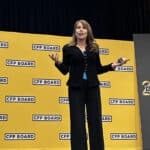There are 11.8 million widows in the U.S. and approximately 2,800 new widows are joining these ranks every day. The average age of widowhood in the U.S. is 59, according to a frequently cited figure attributed to the U.S. Census Bureau. And if COVID-19 continues, the ranks of younger widows could climb.
According to the Brookings Institution, 79,711 men between the ages of 45 and 64 died of COVID-19 during the first 18 months of the pandemic, nearly twice the number of women who succumbed to the virus (45,587). That’s 184 male deaths for every 100 female deaths — making this the age group with the widest gender gap for Covid-related deaths.
Compared to prior generations, more widows are educated, have careers and are running many aspects of the family household. Just over three-quarters (76%) of the widows participating in the Modern Widows Club Impact Study 2020 were under 60 and a large portion were between 51 and 59. But by and large, younger widows who haven’t hit retirement age are an underserved and understudied population. There are several implications for financial advisors who work with younger widows.
A Unique and Stressful Financial Situation
The emotional, logistical and financial needs of a younger widow are unique. I went from being a soccer mom to a caregiver to a widow at 39. Widowhood can also be a tremendous financial burden. Suddenly, I was solely responsible for raising five children without my husband’s paycheck — and with just one year left on his health insurance. I started rethinking my career, and realized I needed to go back to school to better support my family long term.
The loss of a spouse is the most stressful life event. Grief support and therapy are vital. The emotional side of loss and finding the space, time and grief support is a major hurdle for young widows. Widows also experience many emotionally difficult secondary losses. For example, there’s the loss or change of identity, couple friends, social life, routine, traditions, anniversaries, shared dreams, expected future, intimacy, in-law relationships and many more. Being aware of the emotional setbacks beyond the primary loss can help you understand your client better.
Logistically, time, safety and schedules dictate a young widow’s life. Work schedules, school events, transportation and childcare take time and planning. Feeling safe while traveling or at home alone with one’s children is also a common concern. For example, the fear of not knowing whom to call for any home maintenance was debilitating for me. I didn’t want strangers to come to the house and realize we were home alone, or try to take advantage of me financially.
Young widows also have many things to consider financially. Being able to afford their lifestyle, stay in their home and keep their children in the current school are at the forefront. During that first year, many young widows get a quick education in financial documents, Social Security benefits, pensions, life insurance, health insurance, trusts, and many other things as they try to sort through their lives. It can be overwhelming, especially if the widow did not have an equal part in the couple’s long-term planning.
How Financial Advisors Can Help Young Widows Find Their Footing
Today’s clients can easily become tomorrow’s widows. So even if financial advisors don’t currently work with any young widows, they should familiarize themselves with that it takes. There are several steps an advisor can take to help a young widow now and into their future. This includes assisting them in task organization, educating them on the financial implications of remarriage, and learning the best ways to communicate through their grief. Prepare now by developing a list of grief support resources in your area and a curated list of community referrals. Trusted community referrals for home and car maintenance, yard care and auto sales are invaluable from a safety and financial standpoint.
As surviving spouses tackle a volume of tasks and paperwork, they also need space to grieve. Assure them that they won’t need to make many big decisions in the first year. Instead, they’ll mostly need to fill out forms, locate documents and get organized. Grief causes shock, fear and a sense of urgency. Financial advisors can set the pace by organizing tasks into reasonable time frames. They can also become their client’s thinking partner for future decisions.
Here’s a good exercise: Provide your client with a “brainstorm sheet” on which they can write down every task they are thinking about. Then when you meet with the client, you can help them transfer all these tasks onto a timeline that’s arranged by essential, next and later decisions.
Remarrying Risks
Sadly, remarrying can carry some financial risk to young widows. Helping your client understand the long-term financial implications of remarriage is significant. For example, if a widow remarries before age 60, she is not entitled to her late husband’s Social Security. In addition, most pension benefits cease when a widow remarries. Financial aid for college tuition can also be affected when a widow remarries if the household income increases. Doing your due diligence as an advisor and discussing the ramifications of remarriage can empower your client to make the best decisions for her financial future.
Good Grief
Last, yet most important, is to learn communication skills pertaining to grief literacy. You want to feel confident and competent in knowing exactly what to say and what not say to a grieving client. An estimated 80% of widows leave their financial advisor within a year of their spouse’s death because they’re not finding the communication and emotional connections they desire and highly prioritize. On the other hand, widows whose financial professionals employ client-centered communication practices report being more confident in their post-widowhood financial situation.
Grief literacy communication helps normalize the conversations and responses surrounding grief so people feel seen, heard and respected. Here are four categories and examples of what not to say:
- “At least they didn’t have to suffer any longer.” “It’s God’s plan.” “They are in a better place.”
- “You’ll be fine.” “You’re young, you’ll move on.” “Things will get better.” “Time heals.”
- “You should get back out there again.” “I really don’t think that your loved one would want you to be so sad.”
- “I know exactly how you feel.” “I felt like that, so staying busy is what you need to do.” “My grief was overwhelming.”
Learning what to say in a caring, empathetic and authentic way can feel uncomfortable at first. Empathy is meeting the client in the emotion, not the context. Although not everyone can relate to being a widow, you can relate to the sadness, overwhelmingness, fear and uncertainty that they may be feeling.
Here are tips for what to say:
- Acknowledge the loss with a condolence.
- Say their late spouse’s name.
- Talk about what you admired or tell a personal story.
- Ask about their late husband.
For example, “I was saddened by the loss of your husband Jon. I will always remember the deep love and commitment he had for you and his children.”
Financial advisors will have the longest client relationship with a woman and most likely they will be a widow at some point. With the face of widowhood changing, it’s important to develop a modern approach that can’s a good fit for young widows., By preparing upfront, having an organized system, understanding remarriage implications and learning grief communication skills, you can build a reputation for championing grieving clients through the most difficult time of their lives.
Kathi Balasek, MA is a grief literacy communication coach and speaker, university lecturer and widow advocate. Contact her at Grief Smart Advisor.







